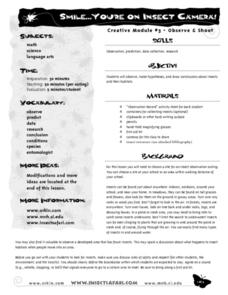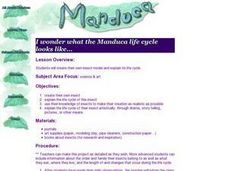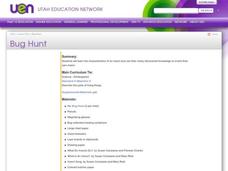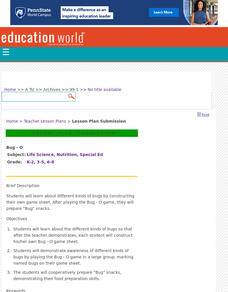Curated OER
Creepy, Crawly Critters
Students study characteristics of insects by creating models from an assortment of materials. They create rubrics showing what an insect must have and create an insect, using a bag of materials. They cut out the puzzle insects included...
Curated OER
Bugs
Students participate in an after school program that promotes communications skills, hypothesizing, exploring, recording of data, leadership roles and making comparisons. They explore the world of insects, where they come from, how they...
Curated OER
Insect Body Parts and their Functions
Learners explore all the parts of an insects body and assess their specific functions. They review an extensive vocabulary list of terms and then relate the parts of an insect to those of a human being. Dragonfly Poetry is also taught...
Curated OER
Insect Monitoring
Students practice the scientific method in the classroom, either in preparation or as a substitution for real-world field experience. They examine a simulated biodiversity research situation, using a "mini-plot" or
sampling square...
Curated OER
Create An Insect
Learners create a new species of insect. They create a list of insect characteristics and use this as a springboard to draw an insect of their own. Students write a brief descriptive paragraphs about their insect, giving particular...
Curated OER
Smile...you're on Insect Camera!
Students study insects. They go on an outdoor insect outing and look for insects in a variety of places--in the air, under rocks, on leaves, in water, etc. They record information about the insects they find, including habitat, weather...
Curated OER
Metamorphosis
Students complete a unit about the insect metamorphosis process. They read and discuss a handout and sequence the events of metamorphosis for a variety of insects. Students also view and hold a tobacco hornworm, and complete a...
Curated OER
Take an Ant to Lunch
Second graders construct a model of an ant, exemplifying that ants are insects. Students gather data create a pictograph chart to show ant food preferences. Also, 2nd graders access the Internet to explore ant eating habits.
Curated OER
The Spider Beside Her
Second graders are introduced to the characteristics of spiders. In groups, they compare and contrast spiders to different insects to discover spiders are not an insect at all. In groups, they create a model of a spider and discuss its...
Curated OER
Insects
Students observe and identify insects in their local. They record their observations by drawing a picture of the insect and writing a description.
Curated OER
It's (Not) Just a Bug: Simulating Invasive Insect Predation on a Plant Population
Students reflect on challenges that face farmers in cultivating crops, including insects. They then simulate how crops are affected by native and non-native insect populations and the options farmers have to protect their crops. Finally,...
Curated OER
Insects
Third graders research an insect and creates a brochure on that selected insect. Each student develops a Venn Diagram comparing similarities and differences between moths and butterflies.
Curated OER
Bugging Out
Students explore how insects behave in their natural habitats and build dioramas to create an Insect World in their classroom. They investigate various insects and the roles they play in the environment. They write creative short...
Curated OER
Prairie Restoration and Prairie Ecology
Students collect data as they identify and classify native prairie plants and insects. They create their own population study using a variety of sampling techniques to determine the population density of various species. Students...
Curated OER
I Wonder What the Manduca Life Cycle Looks Like
Young scholars create their own insect, build a model of it and explain its life cycle.
Curated OER
Bug Hunt
Students study the characteristics of an insect and use their newly discovered knowledge to invent their own insect. They go on a class bug hunt, using the tools and supplies that biologists use when they go out in the field.
Curated OER
Bugs-Eye View
Students research different bugs and insects and write letters from bugs' and insects' points of view to humankind.
Curated OER
Clay Ants: Insect Anatomy
Students examine anatomic structures in order to identify insects from other living organisms. They gain a level of comfort from anxiety when observing and handling live and pinned insects. They create clay models of an insect.
Curated OER
Insects Are Helpful!
Students see that insects do lots good and are very valuable to humans and nature. This is part of an ongoing effort to dispel fears of insects. They rotate through a series of centers that have examples of how insects contribute to our...
Curated OER
Bug-O
Middle school special education students (moderate to severe) learn about insects by playing an entomological version of bingo. They cut out pictures of different bugs and glue them onto a grid. Place the game card inside a sheet...
Curated OER
The Leaf Cafe
Learners explore, research and study about the common local insects that eat leaves. They demonstrate their assessment of plant-eating insects by creating a Leaf Cafe. Each student also makes a chart showing which insects eat other...
Curated OER
Parts of an Insect
In this science worksheet students will label the parts of an insect. Students will synthesize a list of insect names for each letter of the alphabet.
Curated OER
Insects
Students read books, learn about the letter i, and eat raisins that represent ants all to learn about insects. In this insects lesson plan, students also observe an ant farm and play follow the leader.
Curated OER
Habitat Collage
Students explore habitats. In this science lesson, students discuss habitats and the insects that are found within each habitat. Students create a habitat collage.

























